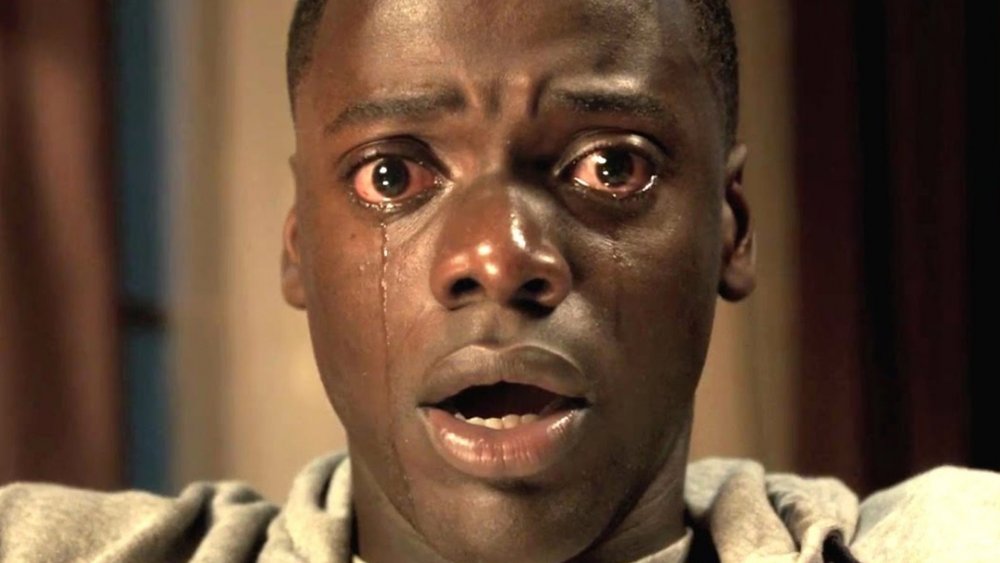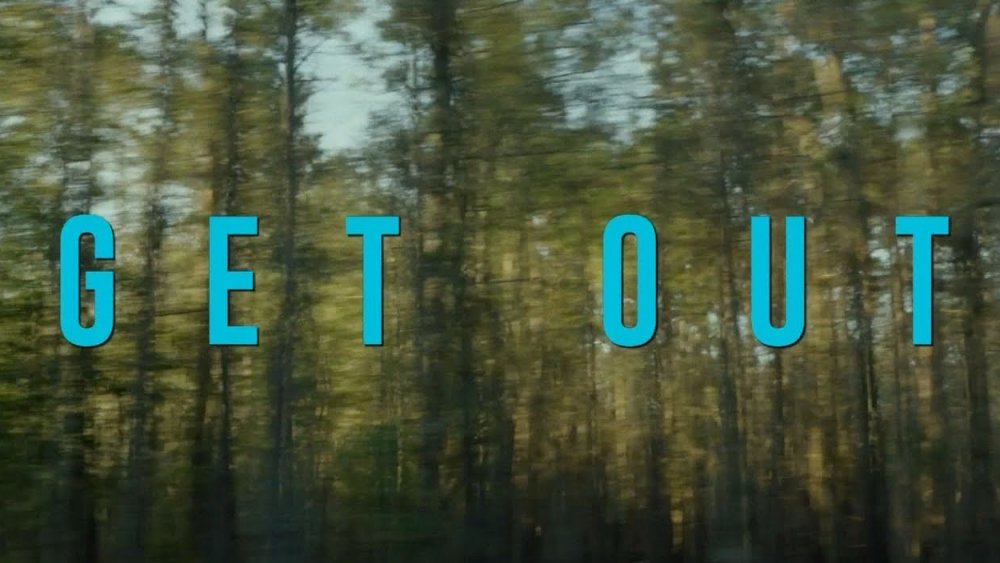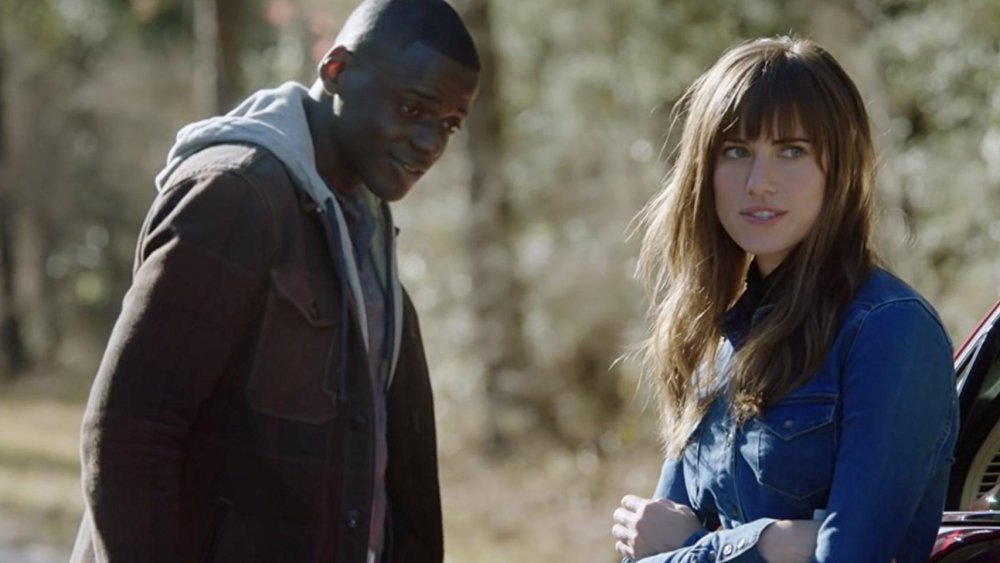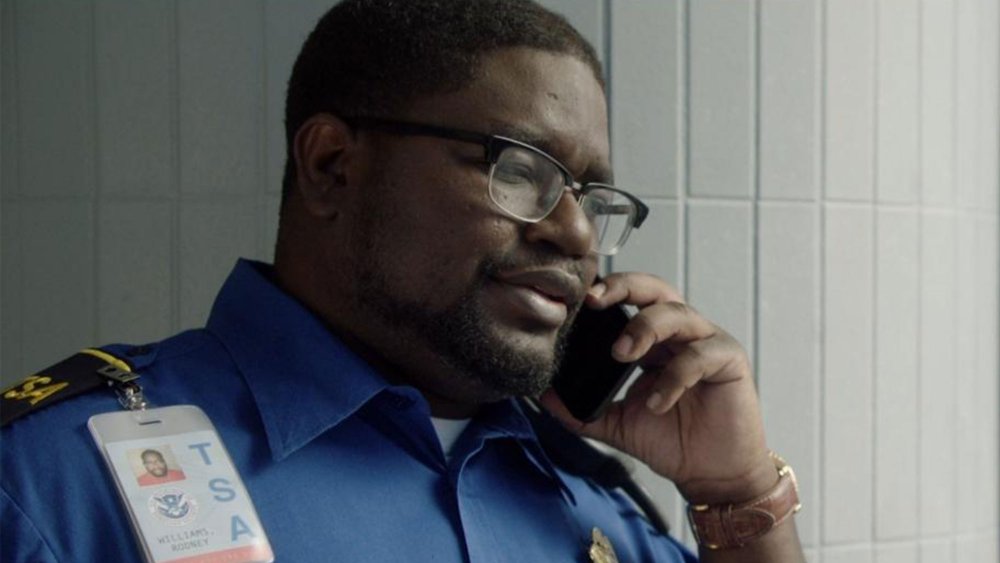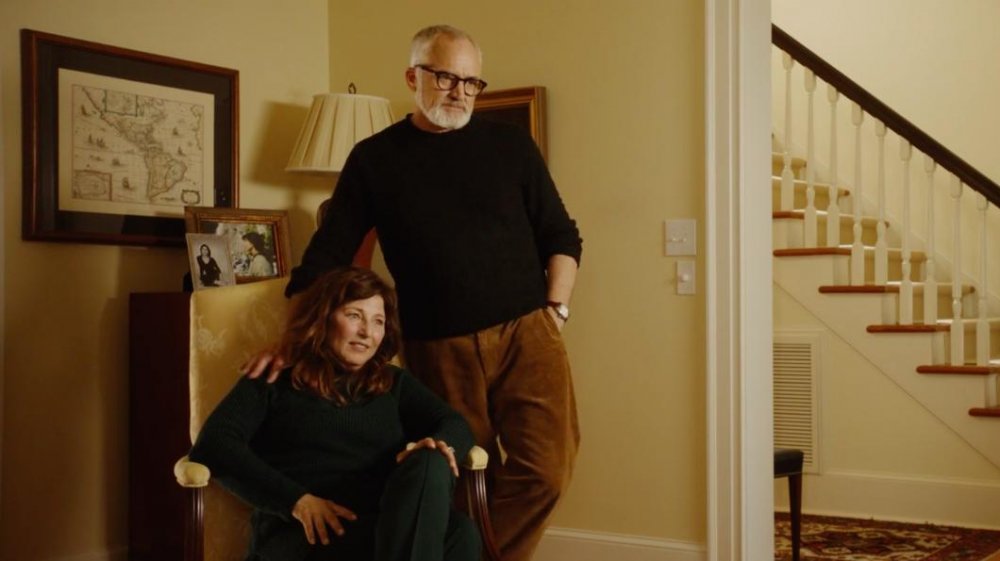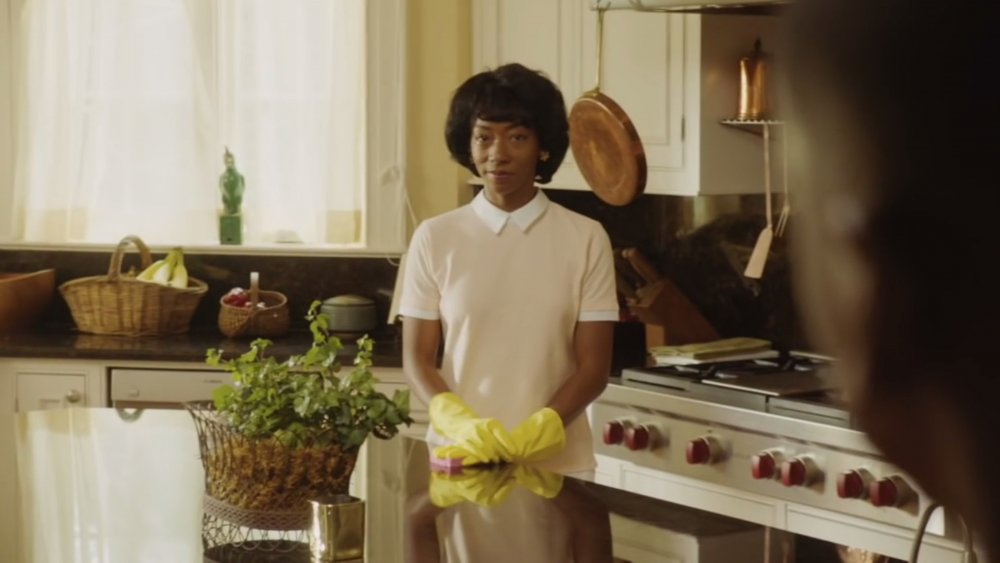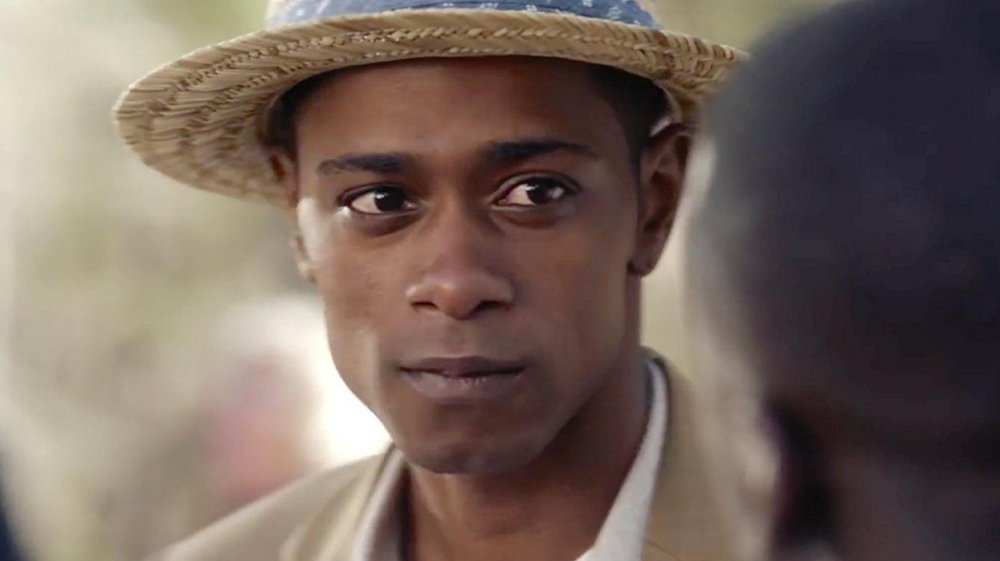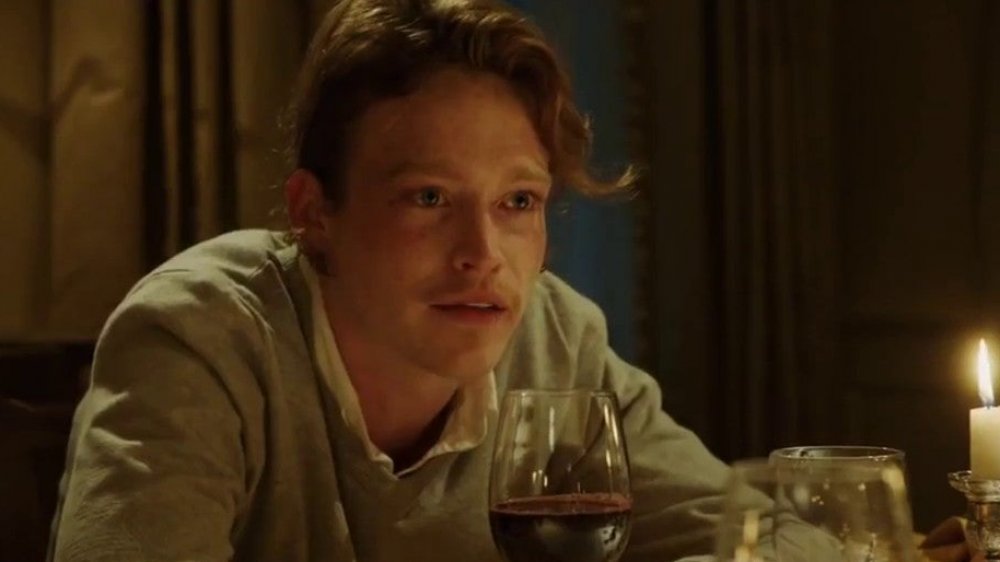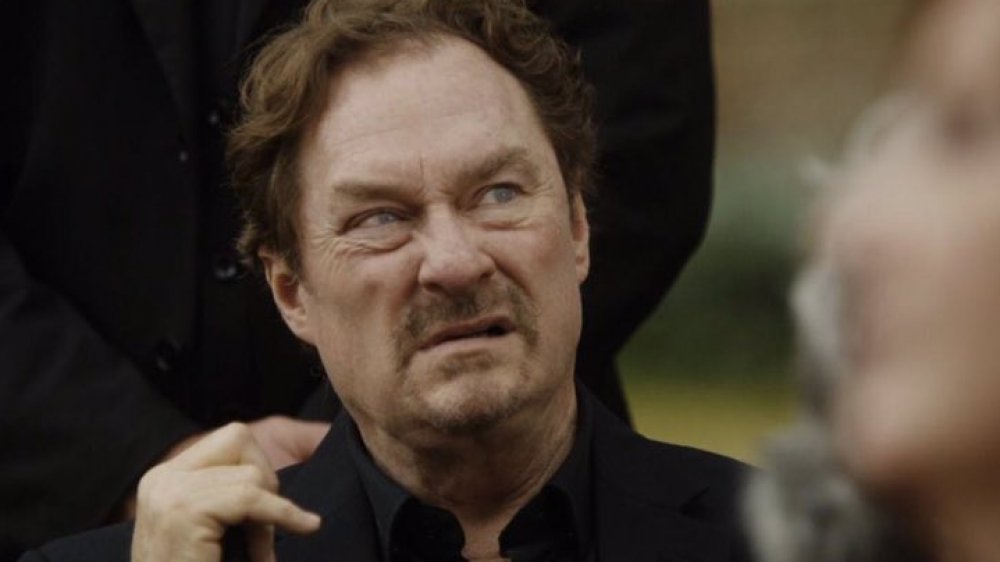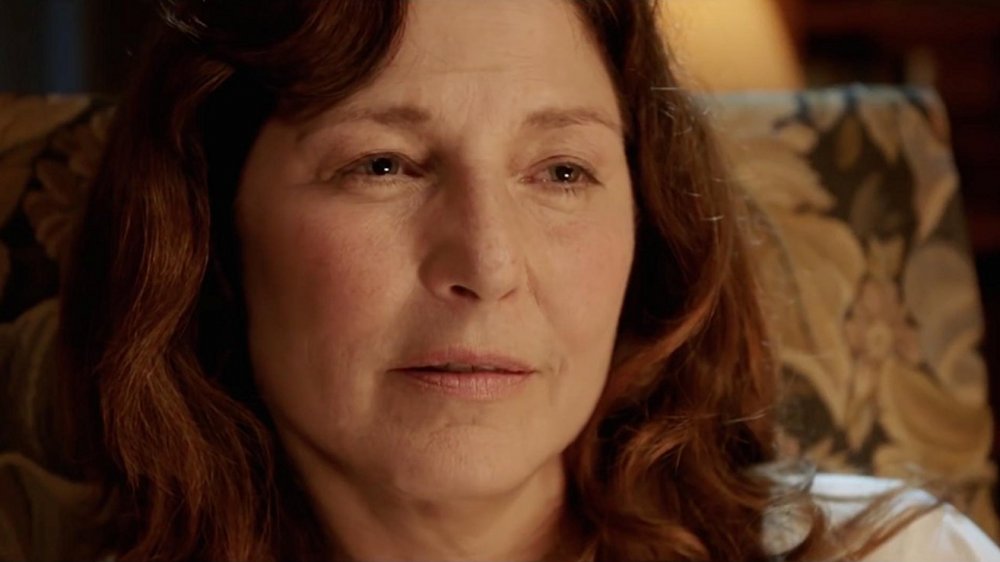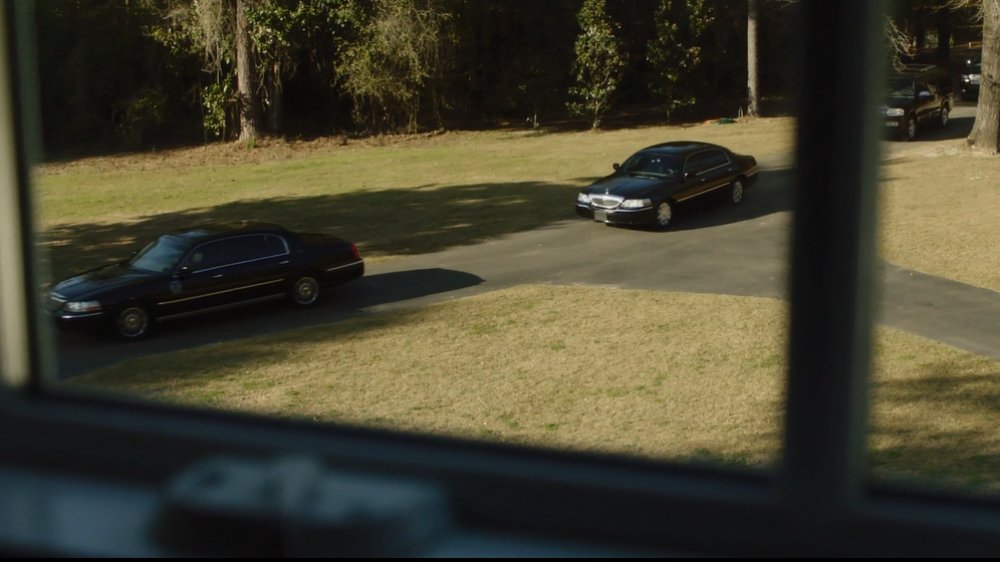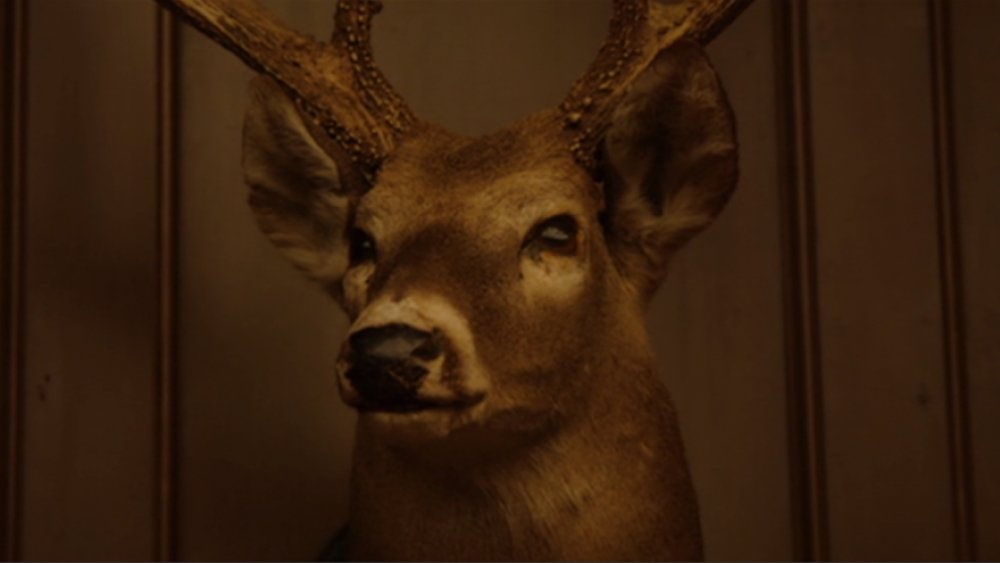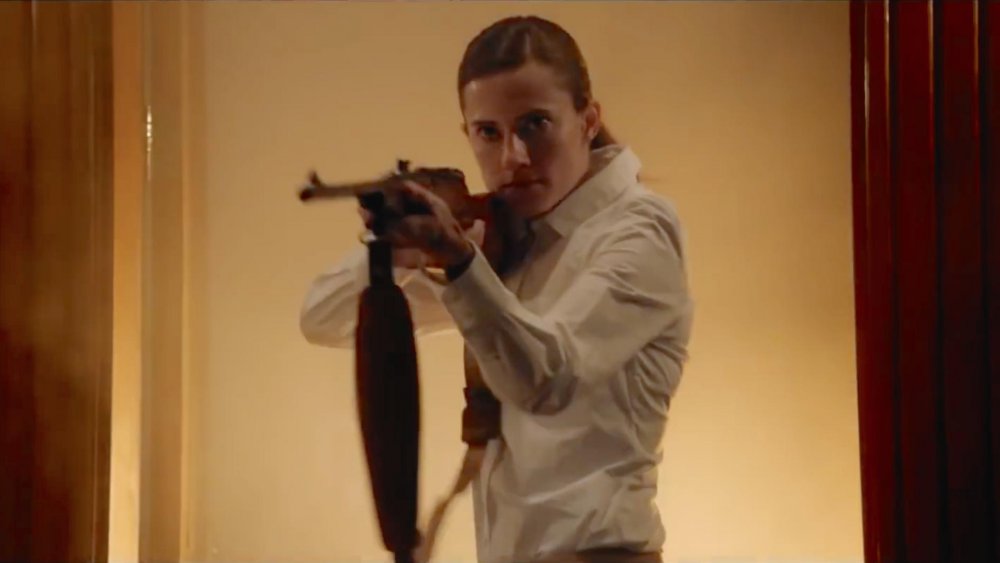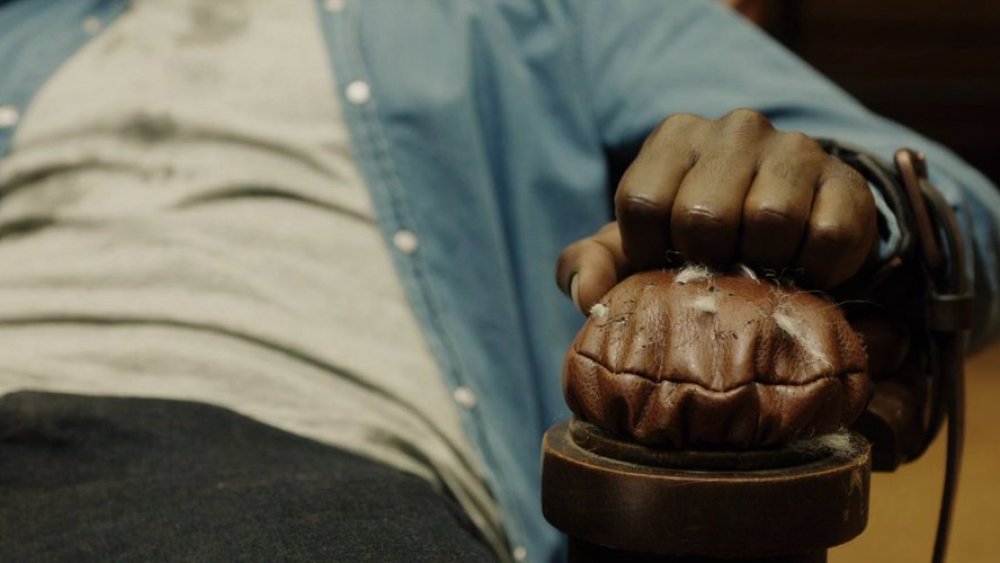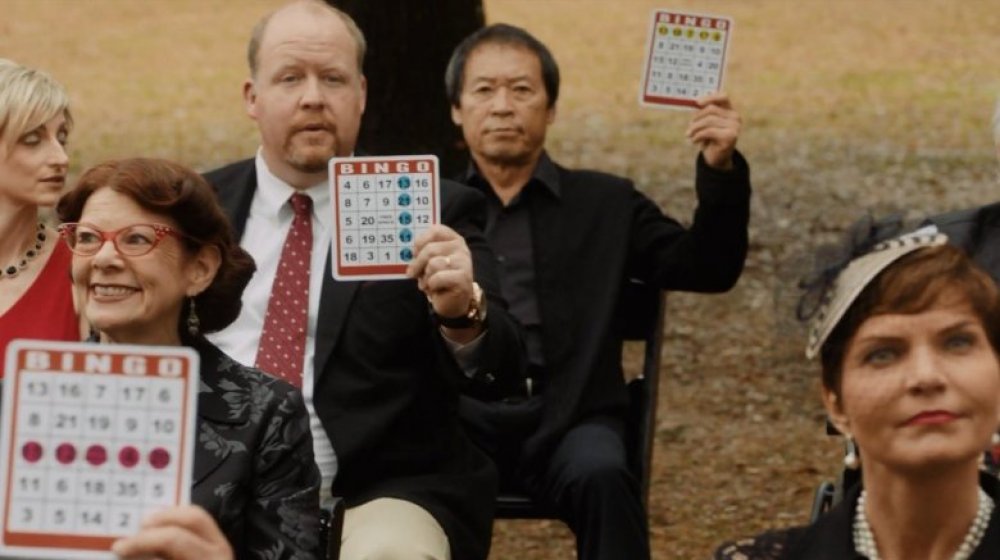Things You Only Notice The Second Time You Watch Get Out
When Jordan Peele's directorial debut, Get Out, hit theaters in early 2017, audiences and critics alike were stunned by the comedian's skill behind the camera, marveling at his storytelling technique and incredible directorial prowess. As for the plot itself, Get Out tells the twisted story of Chris Washington (Daniel Kaluuya), a young Black photographer who goes to meet his girlfriend's white parents. It all starts off relatively peacefully, but before long, it devolves into a horrific tale of appropriation, fetishism, and gruesome violence. Ultimately, the film won an Oscar for Best Screenplay and earned Oscar nods for Best Picture and Best Director, among others, proving that Peele is a cinematic force.
However, perhaps the best part of Get Out is how layered Peele's Academy Award-winning script really is, from its numerous references and its subtle Easter eggs to tiny moments you only notice upon repeat viewings. Whether it's your second or 20th time watching Get Out, here are some amazing things you should look out for when you revisit Peele's critically beloved film. Spoilers for all of Get Out ahead!
Get Out's opening music sends a message
Shortly after a cryptic scene where an unnamed young man is kidnapped and dragged into a car in a suburban neighborhood, Get Out quickly cuts to Chris' apartment, where he and his girlfriend, Rose Armitage (Allison Williams), are preparing for their weekend getaway. As Rose picks out pastries for the trip at a local bakery, audiences hear Childish Gambino's "Redbone," and during the opening credits, there's an incredibly ominous song playing, though the lyrics are in Swahili.
Once you've seen the film and know what the Armitages are really doing at their idyllic country home, "Redbone" takes on a new meaning, especially when you consider that the song reminds the listener to "stay woke" and "not close your eyes." As for the Swahili song? The main lyrics to "Sikiliza Kwa Wahenga," written by composer Michael Abel, contain a warning. If you take the time to translate the song into English, it tells you to "listen to your ancestors," which indicates that something terrifying is just around the corner. The song then reappears during the closing scene and end credits, just to reinforce the message.
Rose's stand against racism is a ruse
As Rose and Chris make their way to the Armitage house, the first scare of the movie pops up when the couple hits and kills a deer on a quiet country road, leaving Chris bereft. Before long, a police officer arrives, demanding to see Chris' license, but not only was Chris not driving, he doesn't even have a driver's license. Incensed, Rose criticizes the cop for targeting her Black boyfriend, seemingly protecting Chris from unfair law enforcement bias. Chris even tells Rose that what she did was "hot."
However, this moment hits differently after you realize that Rose is essentially kidnapping Chris and bringing him to her family's home to steal his body for a wealthy white person. Rose isn't standing up to systemic racism at all, but she's simply trying to avoid a paper trail, as she and her family don't want there to be any concrete evidence that Chris was with the Armitage family. Otherwise, he'll just be reported missing, and authorities will know which direction he was heading.
Get Out makes several references to The Shining
Any horror fan worth his or her salt is probably a fan of Stanley Kubrick's 1980 horror film The Shining, and obviously, Jordan Peele is no exception. Peele has made no secret of the fact that The Shining was a huge influence on Get Out, which is unsurprising, as both are social thrillers about humanity's darkest psychological impulses. And appropriately, Get Out is peppered with clever references to Kubrick's film.
Right at the beginning of the film, Andre Hayworth (Lakeith Stanfield) — the man we see taken hostage by the sadistic, knight-helmeted Jeremy Armitage — is wandering a leafy suburban neighborhood, and he mutters that the street feels like a "hedge maze," referencing the Overlook Hotel's frightening and ultimately deadly wintry maze. There's also a clear reference to the number 237, which represents the Overlook Hotel's most haunted room. When Chris' anxious friend, TSA Agent Rod Williams (Lil Rey Howery), tries to check in on Chris, an announcement can be heard in the background announcing Flight 237.
Dean speaks in riddles right away
Though Dean (Bradley Whitford) and Missy Armitage (Catherine Keener) are welcoming enough when Chris and Rose arrive at their home, there's a sinister undercurrent to everything Dean says when he takes Chris on an abrupt tour of the house. During repeat viewings of the film, it's pretty easy to spot the foreshadowing present in nearly every sentence Dean utters.
Right away, when Chris and Rose say that they hit a deer, Dean goes off on a rant about how much he hates deer, specifically referencing bucks (male deer), and saying that they're overtaking and ruining the neighborhood. As it turns out, "buck" was once a racial slur for Black men who "preyed" on white women. Then, as he shows off trinkets he's picked up during his world travels, he says, "It's such a privilege to be able to experience another person's culture," foreshadowing his theft of Black bodies. Finally, after showing Chris a photo of his father, who lost at the Olympics to Jesse Owens and never quite got over it, he tells Chris the basement is off limits because it's full of "black mold." In actuality, the basement is Dean's surgical wing, and he's not wrong — it is full of Black "molds" waiting to be filled by his white friends.
Georgina and Walter reveal their true natures
Upon his arrival at the Armitage house, Chris and the audience are both shocked to see that the family has two live-in Black employees, which is a pretty unsettling discovery. Dean even admits it, saying that Georgina (Betty Gabriel) and Walter (Marcus Henderson) worked at the house while his parents were alive, and he "couldn't bear to let them go" when his parents passed away.
Apparently, Dean is being quite literal, since the film later reveals that Georgina and Walter are actually Dean's parents, who took over younger Black bodies. In fact, when Chris and Dean arrive in the kitchen, Dean says that the kitchen was his mother's favorite room and that it feels like there's a piece of her there. And that's when the camera cuts to ... Georgina.
Throughout the film, Georgina and Walter also constantly reveal their true selves time and time again, if you pay close attention. When Missy clinks her glass, Georgina becomes startled and is quickly sent away, indicating that the noise of the spoon broke her hypnosis. Plus, Chris catches Walter sprinting through the house's grounds at night, proving that he's really Dean's father, who's still trying to move past losing to Jesse Owens.
Hats and wigs cover up the Armitages' real mission
Ultimately, the Armitages' real goal is uncovered. Every time Rose brings home a Black boyfriend — or, in Georgina's case, a Black girlfriend — the family imprisons the unwilling partner and steals their body for a white host. If it's your first time seeing the film, this reveal will come as a huge shock. However, upon rewatches, there's an easy way to tell who's been stolen by the Armitages, and it has everything to do with their hairline.
Walter, Georgina, and Logan (poor Andre, who was kidnapped in the opening) are presented as concrete proof of the Armitages' twisted endgame, and you can tell each of them are hiding something because they all hide their hairlines. Why's that? Well, after undergoing a kind of lobotomy, all three of them have scars, which Georgina disguises with a wig (which Chris once catches her fixing). Meanwhile, Walter and Logan are never seen without their hats, keeping up the ruse.
Chris always stays ahead of Jeremy
Even though Chris initially gets along fine with Missy and Dean, he immediately gets weird vibes from her brother, Jeremy (Caleb Landry Jones), who tells Chris over dinner that if he trained properly in martial arts, Chris, a fine specimen, could potentially be a "beast." In that same discussion, Jeremy asks Chris if he's ever studied any fighting techniques, and Chris says that he did judo as a kid. Jeremy brushes that off, saying jiu-jitsu is the only way to go. He even compares the martial art to chess, saying that the only way to win a fight is to be at least three moves ahead of your opponent. Rose tries to put a stop to the conversation, but second later, Jeremy even attempts to put Chris in a chokehold.
Eventually, all of that comes to pass for real when Chris must escape the Armitage house before his body can be surgically overtaken by his white host. As Jeremy puts Chris in an actual chokehold, Chris keeps trying to open the front door, but Jeremy stops him every time, kicking it shut. Eventually, on the third try, Chris takes advantage of Jeremy's impulses and tries to open the door one last time. By tricking Jeremy into kicking the door shut, Chris takes the opportunity to stab Jeremy in the leg, besting his opponent by staying three moves ahead.
Chris has a 'good eye'
As the Armitages begin their annual party — one that will eventually turn into an auction for which wealthy white person will use Chris' body as a host for their brain — Chris wanders off with his camera, eventually coming across Jim Hudson (Stephen Root). A blind art dealer who's friends with the Armitages, Jim tells Chris that he's familiar with Chris' photographs and compliments him, telling him he has a "good eye" and that he has long admired Chris' work. He also mocks the other party guests, befriending Chris right away.
Ultimately, Chris' "good eye" makes him a target, and Jim wins the bidding war over Chris' body specifically for that reason. Later on, when Chris is captive in the Armitages' basement before his surgery, Jim directly tells Chris that he wants his eyes, which will not only give him his sight back, but which he believes will also give him Chris' talent as a photographer.
Missy's real reason for worrying about Chris' health is pretty twisted
One of Get Out's many narratives involves the fact that Chris smokes, much to the chagrin of Rose and her entire family. On their way to the Armitage household, Chris reaches for his cigarettes and is immediately chided by Rose. And when he arrives, Dean tells Chris that he also used to smoke, but after Missy hypnotized him, he never wanted another cigarette again. Missy offers to help Chris with his problem, but he demurs, uncomfortable at the idea.
Later that night, when Chris finds Missy drinking tea in the living room, she brings up his smoking habit once again, telling him that it's not only bad for him, but that she doesn't like him smoking around her daughter. However, the truth is that Missy's concern for Chris' health is entirely selfish and manipulative. Missy doesn't care about Chris personally, but she wants to ensure that his body is a perfect, healthy vessel for whichever white person wins the auction.
A fleet of black cars has more significance than you might think
Right from the beginning, the Armitage party is an all-around weird experience for Chris — and seemingly for Rose, though we later learn it's all part of her trap — and eagle-eyed viewers may notice that there are a few key clues right as all of the guests arrive, well before they make Chris uncomfortable with their awkward, invasive questions.
Upon arrival, you may notice that all of the party guests arrive in similar-looking black cars, which takes on a new meaning when you realize that every guest is there to vie for a Black body to steal and inhabit. Beyond that, each guest warmly greets Walter, which might seem odd. Why would the Armitages' friends be so friendly with the groundskeeper? However, once you learn that Walter is Roman Armitage — Dean's father, Rose's grandfather, and the original architect of the entire experiment — it makes perfect sense, as the Armitages' guests are simply greeting their old friend.
The real significance of the deer in Get Out
Get Out is full of symbols, but few are as important as deer. Right at the beginning of the film, when Chris and Rose hit a deer, Chris goes over to the hurt animal and seems like he's about to try and save it, as it represents his mother, who we later learn was hit by a car and bled out on the side of the road when Chris was young. (This moment also betrays Rose's real nature. Chris has empathy for the deer, whereas Rose does not.) And as he tries to escape the Armitage house, Chris' hang-up about hit-and-runs almost gets him killed when he hits Georgina with a car on his way out of the house, and rather than moving on, he stops to pick her up, which ultimately results in her crashing the car.
However, in the end, a deer comes to Chris' rescue in the form of an enormous buck's head mounted in the Armitages' basement dungeon. As he escapes captivity, Chris grabs the head and uses it to kill Dean, and in this moment, the deer gives Chris his freedom.
Rose, get your gun
Before Rose and Chris ever even arrive at the Armitage house, the two joke about the increased pressure on Chris when it comes to meeting her parents, and he even asks her if her parents "know" that he's Black, indicating it may cause a problem. Rose laughs, saying her parents won't care — even bringing up Dean's oft-repeated comment that he would "vote for Obama a third time" if he could — and the two joke about Dean potentially chasing Chris off of his property with a shotgun.
In the end, it's not Dean who chases Chris away from the Armitage house with a gun. It's Rose herself. While Chris is outwitting and killing the rest of the Armitage family to save his own life, Rose is upstairs in her room, googling NCAA players to find her next victim, but eventually, she hears a noise and heads downstairs to investigate. When she sees Chris escaping, Rose arms herself with a firearm, chasing Chris down.
Cotton saves Chris' life
Just when Chris' situation seems completely, irreversibly dire, he figures out a way to save himself, and of course, there's plenty of symbolism behind his decision. Trapped in the Armitage basement and tied to an armchair with a recording of Missy clinking a spoon against her teacup, which initiates hypnosis, Chris is initially helpless. But when Jeremy arrives to bring him into the operating room, he pretends to be asleep before overpowering Jeremy when his restraints are removed. After bashing Jeremy in the head with a bocce ball, Chris pulls two wads of cotton from his ears, which he picked from the armrests of his chair to keep himself from being hypnotized.
The symbolism is pretty obvious here as it pertains to the history of American slavery, since many slaves were forced to spend hours in cotton fields, picking the material for their masters. However, in this instance, picking cotton freed a Black man from captivity.
The Armitages' odd guests drop plenty of hints
Throughout the Armitages' garden party, Chris and Rose are both made extremely uncomfortable by the other guests, who ask the couple insanely invasive questions that seem totally out of line. From the former professional golfer who tells Chris that he "knows Tiger [Woods]" to the woman who asks Rose if Chris is really better in bed to the man who loudly declares that "Black is in fashion," it might just seem like these elderly white people simply don't have manners. However, their questions are pointed, as they're each trying to decide whether or not to bid on Chris based on physical and societal factors.
Beyond that, the color palette of the party has some significance, as well. Many of the guests are wearing red, black, or a combination of the two, representing both aggression (red is seen as an aggressive color by many) and the Black bodies they steal. Meanwhile, Chris is wearing a bright blue shirt, indicating a sense of calm and a cool-headed nature, which is ultimately what gets him through this horrible ideal.
